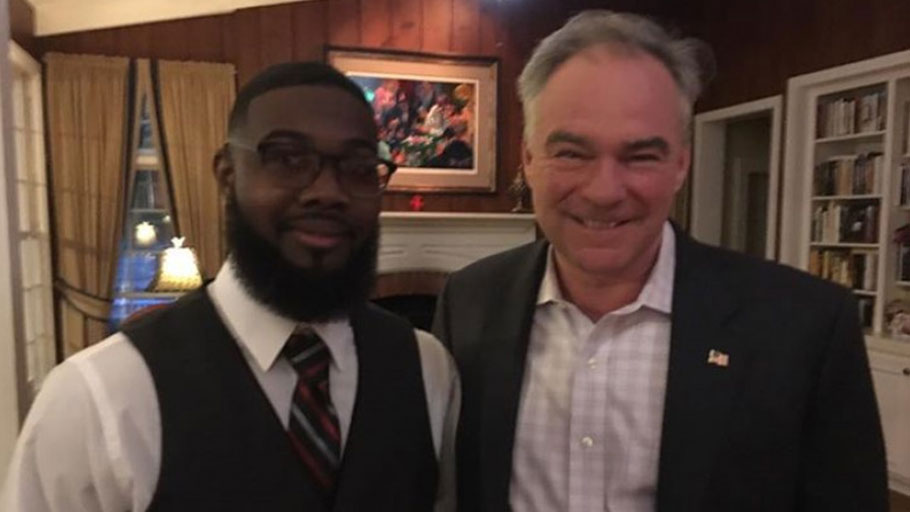Booker Gainor, 27—Cairo, Ga.’s first black mayor—with Virginia Sen. Tim Kaine (Kurtis Edwards via Twitter)
In what is being termed a watershed referendum against “Trumpism”—just as the 2016 presidential election was about tapping into the racist tendencies of America, pushback against the political status quo—black people showed up and showed out in Tuesday night’s elections, giving Democrats several sweeping electoral victories.
This is not to say that only black people elected the mayors in the seven cities that saw their first black mayors last night; some of the cities—most of them in the South—did not have black majorities (or even pluralities). Also, at least one in the pack is a millennial and two are women; and the wins came in places as disparate as Georgia, Montana and Minnesota. Two mayors hailed from cities rocked by high-profile police shootings, but most ran on platforms of progressivism or inclusion.
African Americans were elected mayor for 1st time:
Statesboro GA, Jonathan McCollar
Georgetown SC, Brendan Barber
Milledgeville GA, Mary Parham Copelan
Helena MT, Wilmot Collins
Cairo GA, Booker Gainor
St Paul MN, Melvin Carter
&
Charlotte NC –> Vi Lyles, 1st Black female mayor— Kristen Clarke (@KristenClarkeJD) November 8, 2017
The biggest mayoral story—involving the biggest city—was that of 66-year-old city administrator Vi Lyles, who was elected the first African-American woman to become mayor of Charlotte, N.C., on Tuesday. Lyles handily beat Republican Kenny Smith, who heavily outspent her.
Y’all. My mother @ViLyles made history tonight. She is the FIRST EVER Black woman elected Mayor of Charlotte, NC! pic.twitter.com/Acq5ZeVE2y
— Aisha Alexander (@AishaThinker) November 8, 2017
Two major issues in Charlotte included division over House Bill 2, also known as the “transgender bill,” which repealed a Charlotte ordinance that had extended some rights to LGBT people. There was also the issue of how the city handled the unrest that followed the police shooting death last year of Keith Lamont Scott.
Then there was Jonathan McCollar, the new mayor in the tiny town of Statesboro, Ga., a majority-white hamlet, who built his win on a platform of “change and inclusion.”
Honored to have shared in such a historic night with a Statesboro legend, Mayor-Elect Jonathan McCollar! pic.twitter.com/8fCtIhPqHq
— James C. Woodall (@iMajorWish) November 8, 2017
And Wilmont Collins of Helena, Mont.? He’s now mayor of a city that is more than 93 percent white—but, again, ran a campaign based on progressive principles including reducing teen and veteran homelessness and ensuring access to clean water.
The story of 38-year-old Melvin Carter of St. Paul, Minn., involves an issue that has been a lightning rod across the nation—the killing of African Americans by police and the need for police reform. Carter, the son of a St. Paul police officer, was notably supported by the family of Philando Castile, who was tragically shot and killed by a police officer on video in 2016.
#BREAKING Brendon Barber is the new mayor of Georgetown. Crowd at the Voter Registration Office erupts with excitement @Live5News #chsnews pic.twitter.com/0j99r8pIku
— Brad Streicher (@bradrstreicher) November 8, 2017
Other first-time black mayors include a woman, Mary Parham-Copelan of Milledgeville, Ga., who scored an incredible upset over her incumbent opponent with six votes.
@MattThielkeWGXA and I, live on @WGXAnews with Milledgeville new Mayor- Elect Mary Parham-Copelan pic.twitter.com/TM97J2VLOd
— WGXA photog Carlos (@photog_carlos) November 8, 2017
In smaller cities, wins went to Brendon Barber of the the seaport city of Georgetown, S.C., and Booker Gainor of Cairo, Ga., a millennial in a small town with a small white majority.
Booker Gainor is quite handsome, 27 years old, black, and intelligent. . . and also Cairo, Ga first black mayor. pic.twitter.com/AYAezdLGjg
— Kurtis Edwards (@cartokurtis) November 8, 2017
This freshman class joins dozens of black mayors across the nation—in cities large and small, urban and not.
Congratulations to them all!















